In a recent interview with Rubika Liyaquat, Narendra Modi made a striking statement: “I am convinced that I’m not biologically born but I was sent directly by God. I didn’t take birth biologically because God has sent me and I have appeared here. The energy I have cannot come from a biological body, only God can give this type of energy.” This implies that Modi sees himself as a divine figure.
Thinking oneself to be God can signal mental issues, but saying it publicly isn’t necessarily a sign of madness. The belief is one thing, the public declaration can be a tactic. Modi’s statement might be aimed at attracting voters. People who feel insecure might look for a god-like figure for psychological comfort. A politician who presents himself as divine offers wealth, fame, and security.
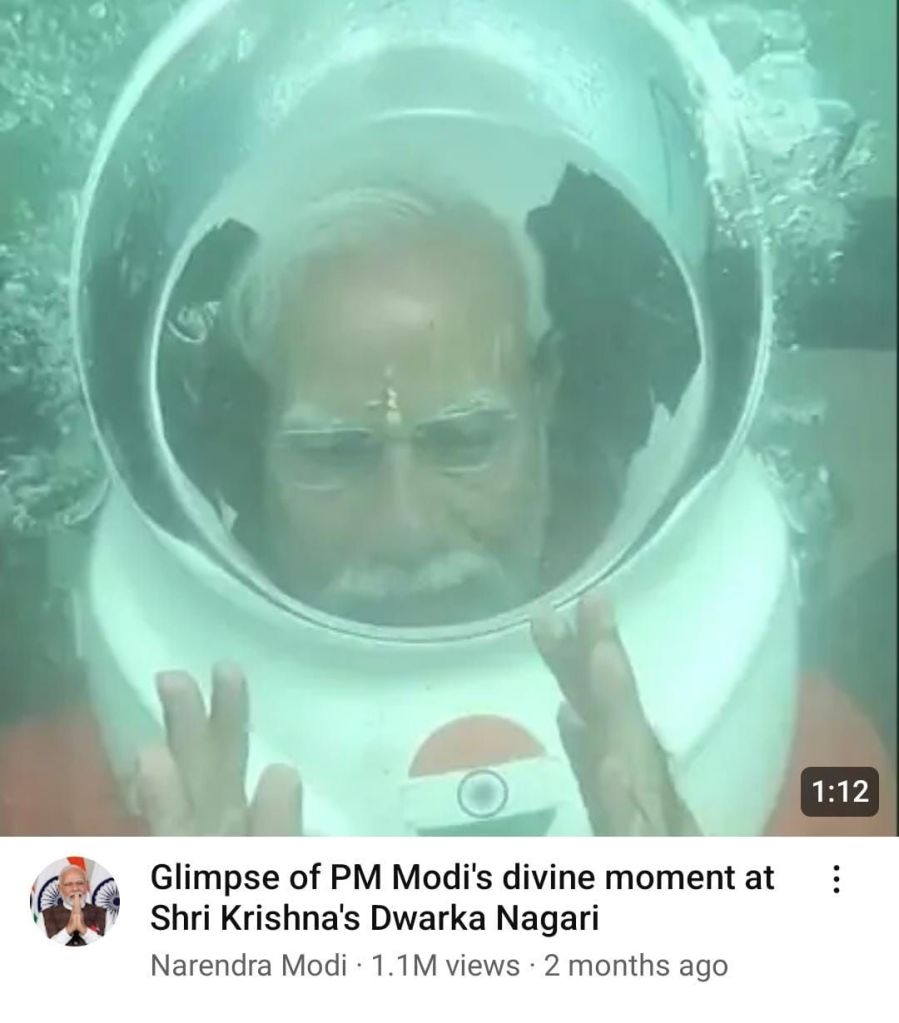
Religion’s concept of God commands wide respect. People may disagree on many things, but hesitate to deny God’s existence. By portraying himself as God, not just a follower, Modi taps into this respect. A follower can be criticized, but a god is seen as perfect and beyond human flaws. His divine claim is a way to ensure his followers see him as infallible and beyond criticism. Religion, as sociologist Emile Durkheim noted, is a powerful and lasting social force.
Religion, as sociologist Emile Durkheim noted, is a powerful and lasting social force.
Examples of this strategy include:
- In 2016, a viral Facebook post claimed people saw Modi in the sky. The supporters claimed to be blessed to see such an eminent personality in the form of God.
- In 2017, the “Modi Chalisa” became popular on social media.
- Modi is often depicted in meditative poses, wearing orange robes, surrounded by priests, and mythological symbols like the golden Shesh Nag.
Thinkers like Niccolò Machiavelli and Erving Goffman suggest that leaders need to manage their image. Modi’s religious imagery boosts his image. Recently, BJP spokesperson Sambit Patra called Lord Jagannath a devotee of Modi. Modi’s supporters often refer to him as Vishnu’s Avatar or even God on earth.
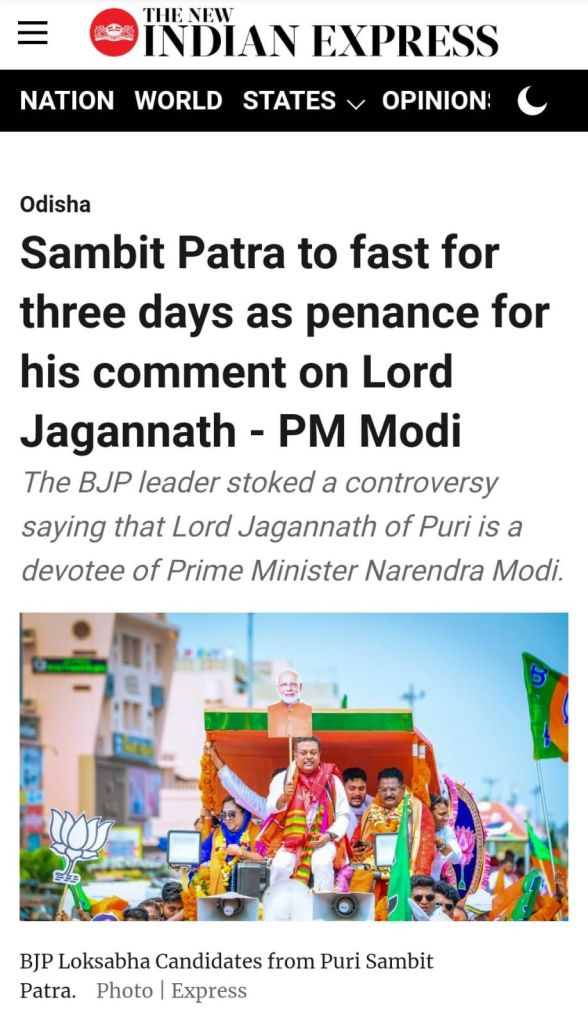
Bjp saw the dictator narrative is slipping off, thus they are choosing to make Modi God now. For a dictator can still face resistance, but God cannot. This is what happens, when polity, morality and religion as institutions mix together. Many in India have recently seen justifying dictatorship but since India is still officially a democracy therefore, we need a God in democratic setup.
A dictator still has the possibility to face resistance, God doesn’t. Modi doesn’t want to be remembered as a dictator. But as God. Thus, even if he loses this election, it will be a win win scenario for him. If Modi loses, BJP will say “God got defeated. ” If Modi wins, BJP will say “God won”. They won’t explicitly state Modi as God. By mentioning God or avatar , people can have multiple interpretations. Some may view it as Rama who got defeated or won, and some as Modi. (If you cannot convince them, confuse them) Yogi Adityanath had even said earlier that this election is between shiv bhakt and ram bhakt. Other leaders have invoked the sentiment of this election being a pro-religion or anti – religion election.
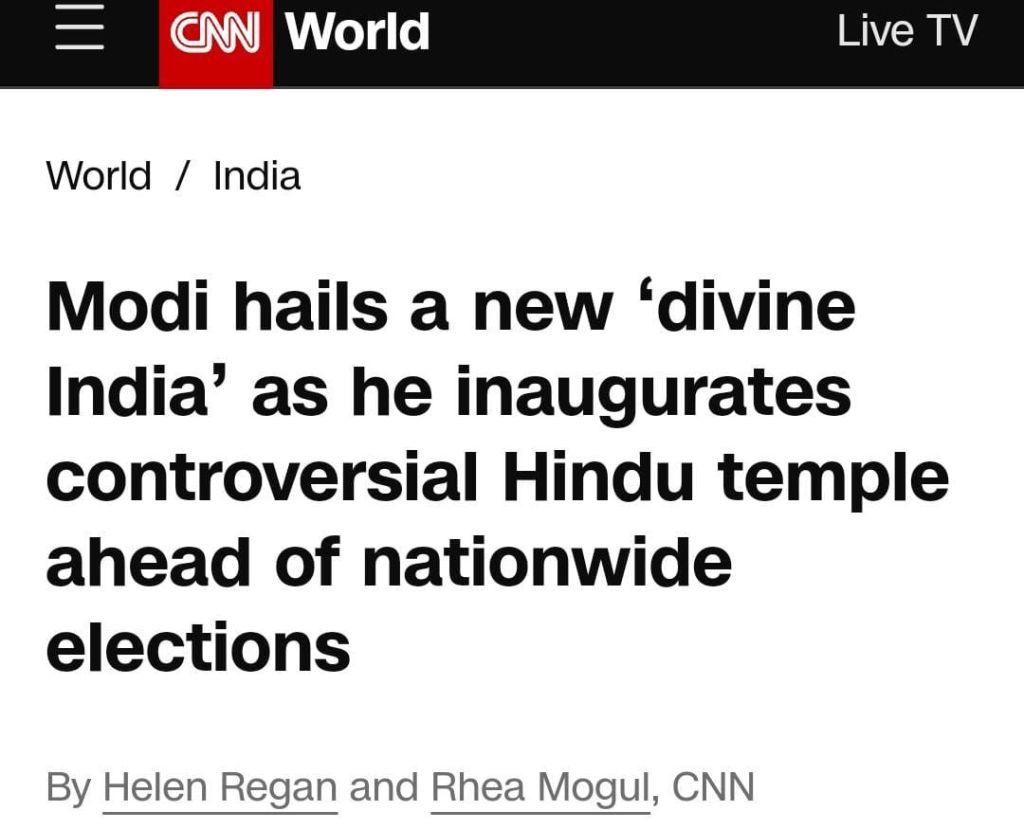
During the Ram Mandir inauguration, Modi fasted to evoke Rama, and on the Ayodhya verdict day, he was shown holding Rama’s hand. BJP’s new slogan, “Jisne Ram Ko laya hum ussey Layenge,” reflects this religious-political message. Modi also claimed to be beyond Hindu or Muslim identities, suggesting only God can say that because God doesn’t discriminate. This philosophical approach makes him appear morally superior.
This religious politics is not just communalism; it’s an attempt to create a new religion centered on Modi himself, making him a figure of worship. Modi isn’t just using religion for political gain; he’s positioning himself as a new deity.
Ram temple was only an episode of the movie which modi claims to be a trailer. This is no longer about the monopoly of one religion in India now, this has evolved to the transition of a politician to God. There’s already a Modi temple in India, Modi books are also popular in some parts of the country. Kim Jong un of North korea has feared people, but modi has hypnotized people.

Religion binds communities. By positioning himself as a divine figure, Modi uses the power of religion to unite his supporters and elevate his status beyond a regular political leader.
This can be seen as a strategy to win the 2024 elections. Here’s how this strategy works:
1. Cultivating a Divine Image:
By claiming a divine status, Modi taps into deep-seated cultural and religious beliefs. People often revere and follow religious figures without question. By presenting himself as more than a mere mortal, he seeks to elevate himself beyond ordinary political criticism.
2. Strengthening Emotional Bonds:
Religious imagery and divine claims can create strong emotional bonds with voters. This can make his supporters more loyal and less likely to be swayed by his political opponents.
3. Creating a Protective Shield:
Psychologists see such behavior as narcissism and the need for validation. Leaders with narcissistic traits may present themselves as special to mask insecurities and gain support. By portraying himself as god-like, Modi seeks absolute loyalty and reverence, shielding him from criticism. Invoking religious imagery and divine status aligns him with the powerful institution of religion.
By positioning himself as a deity, Modi attempts to make himself immune to criticism. It’s easier to question a politician than a god-like figure. This reduces the impact of negative publicity or political attacks from the opposition.
4. Mobilizing Religious Sentiments:
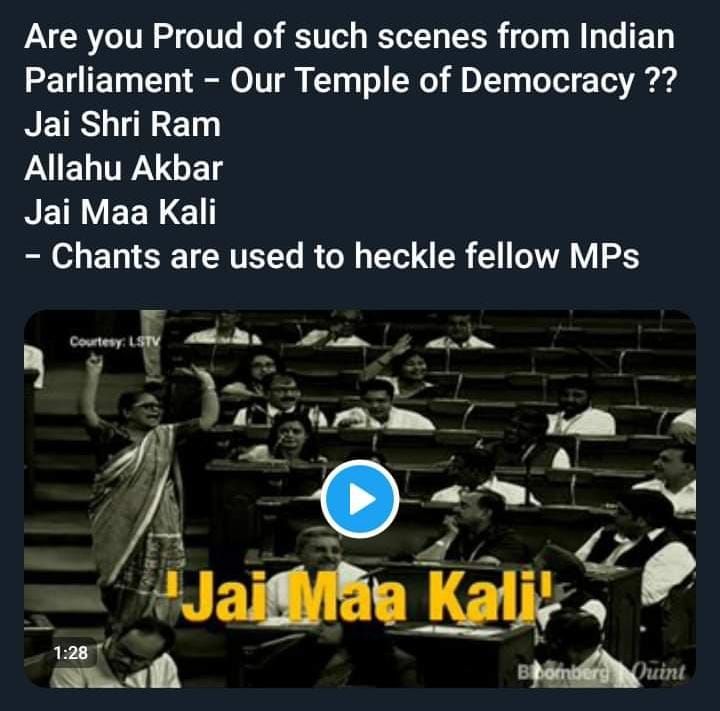
India has a large and diverse religious population. By invoking religious imagery and narratives, Modi can appeal to a broad spectrum of voters who hold these beliefs dear.
5. Projecting Moral Superiority:
By claiming to be beyond Hindu or Muslim identities and adopting a divine persona, Modi aims to appear morally and intellectually superior. This can attract voters looking for a leader who transcends traditional political and religious divides.
6. Consolidating Power:
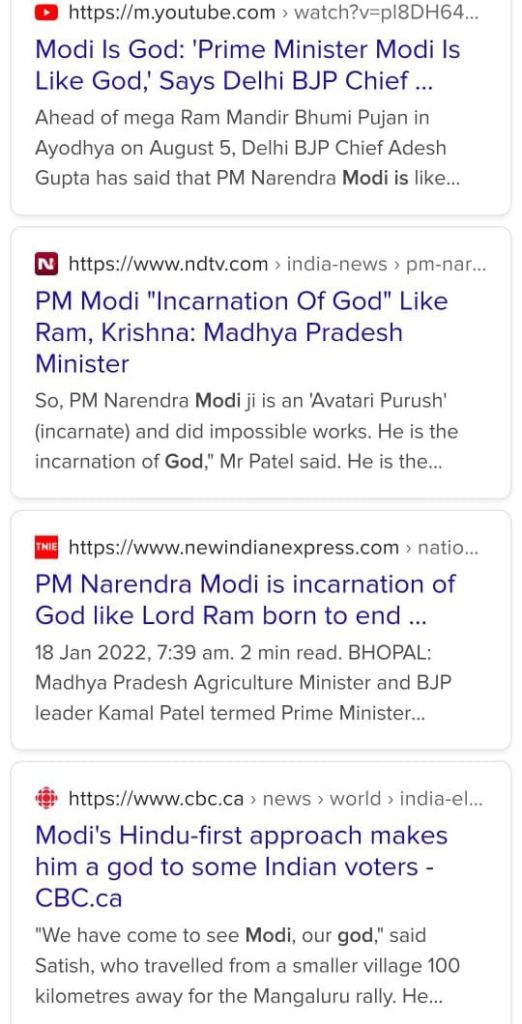
Political theorists like Andrew Heywood and Michel Foucault suggest that leaders seek validation and authority through such grandiose self-perceptions. By positioning himself as a divine figure, Modi consolidates his power and authority, making it difficult for opponents to challenge him effectively.
7. Historical Precedents:
There have been instances where leaders used religious and divine imagery to consolidate power. By aligning himself with this historical strategy, Modi seeks to secure his position and influence.
In our Indian mythology which modi has made history, we have heard stories of prominent devotees, out of greed wanting to take Indra’s seat and or heaven. Mythical figures have wanted to take the place of God. They went against their deities whom they once worshipped, wanting to take their place. The desire to be God is a subconscious desire present in many politicians in history.
Never in Indian history has a person attained sainthood while living. Mother Teresa was called a saint after death. People make stadiums on names of death people. Modi is alive yet he has a stadium in his name. Modi isn’t merely concerned about victory, he wants to experience what it feels like to be God and revered as a supernatural entity while living. For even if someone else wins, they have won after a struggle. No one in indian history has experienced this treatment especially a politician. This is what makes the situation win-win for Modi. Despite the contributions of Gandhi, Nehru and Indira Ji there are people who venomously hate them and people who love them enormously.
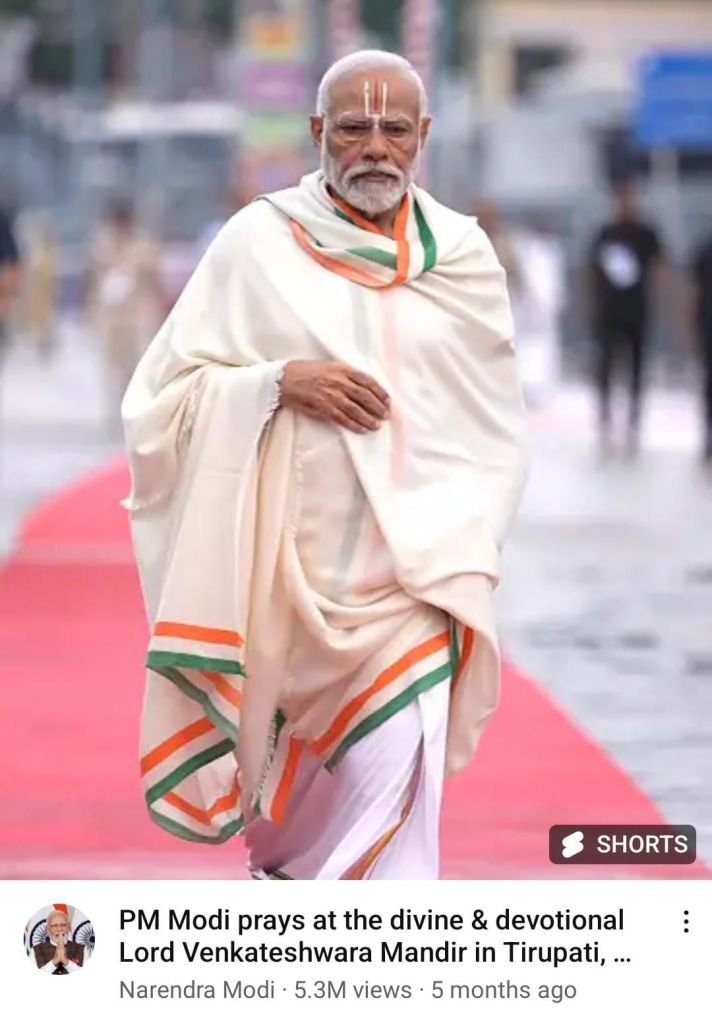
Future implications:
If Modi loses:
If Modi loses, that would lead to a change of government. However, modi supporters won’t perish. Modi supporters who will be there for decades they will claim modi to be the wronged God or misunderstood patriot. Supporters however less, even a decade after his political ending, will see him as God not as a political leader. They will evoke sympathy for him as a wronged God or inconvenient nationalist. People will fall for this underdog orientation. Those who have natural tendency to be sympathetic towards the weak, will be curious to know what modi did and why he was ousted. They will then be reading the books, watching the podcasts made during his reign and formulate a new thesis.
A century later if a government comes that proves disappointing , people will again fall for Modi, portraying him as less evil. On the other side, if not at a national level, at a regional level of a right wing government forms with good intentions, it will still be falliable. The idea that right is not good for democracy will be established. While seeing the debacle of Modi, any future government would be fearful to be authoritarian. Having said that, if India doesn’t comes up with a third front, we would then never have a proper opposition. An opposition with Modi’s fanboys would only be reflective of a egostic cold war. It’s unlikely, their ideas will come out of genuine concern for the people. The right wing ideology this way would always prove to be sceptical.
If Modi wins:
If Modi convinces the public of his divinity, his mission is accomplished. Modi aims to be seen not just as a devout leader but as a god. The intention is possibly this: His wish will become the law, people won’t worship Ram anymore, people will worship Modi. A modi supporter was recently heard saying, Modi is greater than his father. India cannot be ever healed properly if that happens.
With elections underway, I want to share a book I wrote on right-wing political psychology. It explores how Modi influences people and the psychological tactics he uses. Please read it for deeper insights on political hypnotism and illusion mechanism.
The Sangh Parivar Psyche: Understanding Indian Right-Wingers
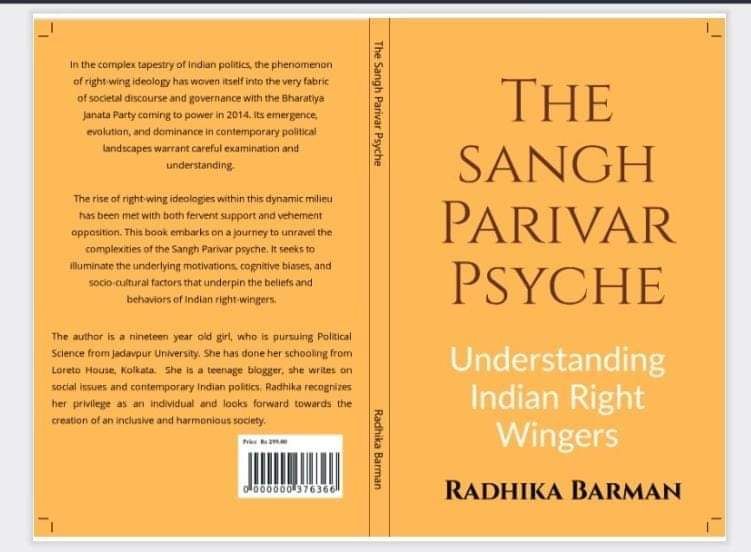
Thank you for reading:-)

Very well written
LikeLike
Thankyou
LikeLike